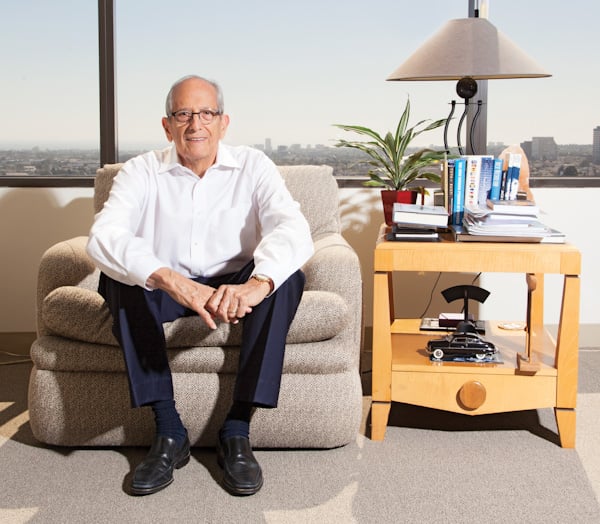After his transplant, lawyer co-founds research group focused on developing synthetic kidneys

Hollywood attorney Kenneth Kleinberg, who had a kidney transplant in 2007, is co-founder of the University Kidney Research Organization. Photo by Daniel Doporalski.
Kenneth Kleinberg’s client list is a veritable who’s who of Hollywood, including the likes of Johnny Depp, Jack Nicholson and J.K. Rowling. As a founding partner of Los Angeles’ Kleinberg Lange Cuddy & Carlo, he’s negotiated agreements and counseled on film and TV rights for more than five decades.
But these days, much of Kleinberg’s time is taken up by an endeavor that captivates less of the public imagination: kidney research.
As co-founder of the University Kidney Research Organization, he and the medical team at the University of Southern California are on a mission to put a synthetic kidney into human clinical trials by the end of the decade. While stem cell research led by USC scientists Zhongwei Li and Andrew McMahon has come a long way in producing a prototype viable in mice, they need $50 million to get to the finish line.
Kleinberg has called upon clients for fundraising efforts; what he hasn’t done is “go to a client and ask for $50 million,” he says. “It’s more likely that they’re gonna say, ‘Gee, I came to see you to see if you could earn me $50 million.’”
Kleinberg’s foray into the study of kidney disease began at MIPCOM Cannes in 1998, an annual gathering of television and entertainment executives. He became sick while on the trip. Once back in Los Angeles, USC nephrologist Dr. Vito Campese diagnosed him with minimal change disease, a kidney illness whose ambiguous causes and treatment haunted Kleinberg. Probing his doctor for details yielded nothing but a dearth of information.
“I kept asking, ‘What do I do now? Are there any breakthroughs around the bend?’” Kleinberg says. “And I learned, much to my dismay, that unlike AIDS and heart disease, there were few major centers of research in the U.S. devoted to kidney disease. That was a shock.”
Indeed, a 2022 article in the research journal BMC Medical Education found that nephrology was the least favorite subject of medical students, who felt less confident diagnosing, managing and understanding the conditions than other health issues.
Before Kleinberg received a kidney transplant in 2007, he had dialysis treatments three times a week for six years.
After the ordeal, Kleinberg and his doctor decided to establish a Los Angeles research center. Given USC’s track record in setting up foundations, the two proudly unveiled the USC/UKRO Kidney Research Center in 2012.
As president and co-founder, Kleinberg sits in on a weekly executive committee meeting to, among other tasks, figure out how exactly to fundraise the millions of dollars they’re seeking.
“It’s complicated,” Kleinberg says. “We’ve tried several routes—we’ve given dinners where we’ve had up to 350 people, we’ve given awards to prominent people in the world of medicine and kidney disease to encourage them.”
The UKRO team hopes that going the traditional route of annual fundraising evenings would be an efficient way to not only raise money but to also help UKRO obtain the reputation of being an organization that recognizes people in the field who deserve to be recognized.
After all, Kleinberg is quick to repeat: “It wouldn’t be appropriate for me to be alone in the footlights. There are a lot of people who have done a great deal. Nephrologists as a group are a bit shy, and they just needed a promoter to help them define their message.”
This story was originally published in the February-March 2024 issue of the ABA Journal under the headline: “Making a Match: After his transplant, lawyer co-founds research group focused on developing synthetic kidneys”



